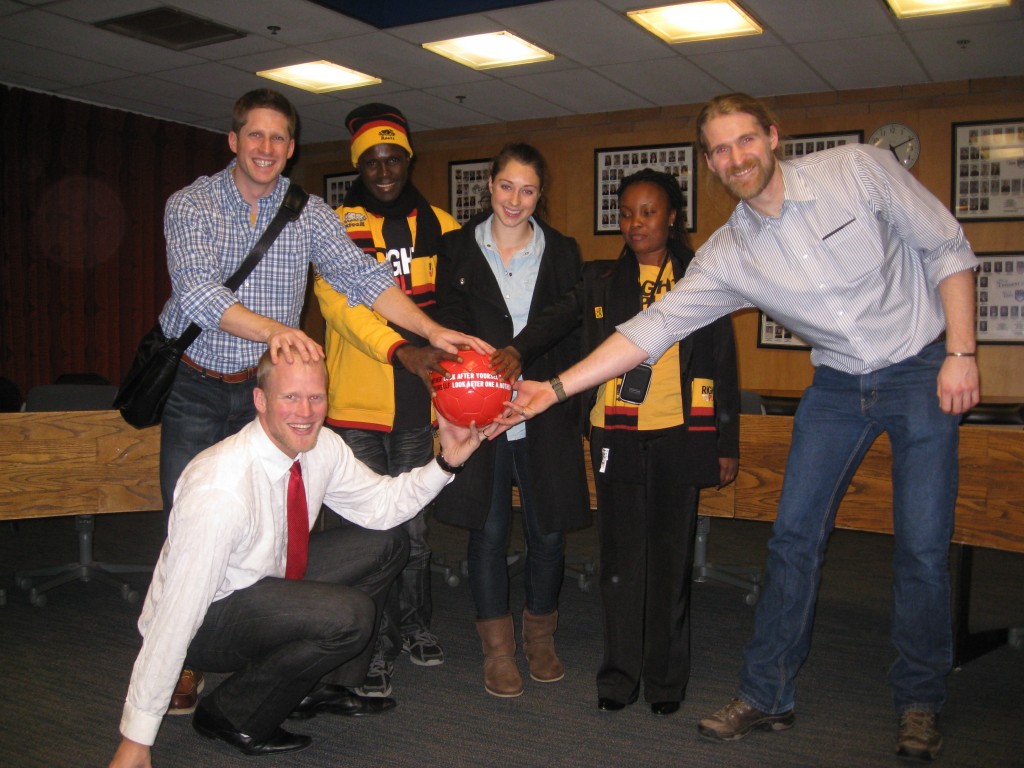By Jordan Hanssen
Yesterday Adam, Rick and I met two Right to Play coaches – Keifala and Helena from Liberia – at the Canadian Awareness Program for Right to Play in Vancouver. They showed us, through play, what they did in their community and related to us the impact that it had in a few short years. Out of all the lessons they showed us, the one that resonates with me today might be the simplest. It’s a song that Kaifala uses to end every play session, sung to the tune of Frere Jacques:

Wash your hands
Wash your hands
With some soap
With some soap
If you do not do this
If you do not do this
You’ll get sick
You’ll get sick
Simple, pragmatic, and it hammers home one of the easiest ways to avoid and not spread sickness. Hopefully everyone reading this blog is following this fine habit and washing his or her hands according to how the World Health Organization suggests.
When did you learn to wash your hands? Who taught you? Probably your parents, and their parents before that, and perhaps their parents. But before that, chances were that no one was doing it unless by accident.
Hand washing, as basic and sensible as this seems to us today, was an idea that came up in the 1840s… by a doctor named Ignaz Semmelweis. This observant Hungarian with a huge forehead and snazzy mustache thought he saw a connection between mortality in birthing mothers and the fact that his doctors delivering babies were handling cadavers before they assisted with labor. Yes, you can be grossed out by this, but only after acknowledging that visceral reaction you feel and are thankful that it is a direct result of the work of Dr. Semmelweis.

He began insisting that his doctors wash their hands before touching expectant mothers, and guess what happened? Fewer women died in childbirth. You would think that this incredibly good idea would have caught like wildfire, but he experienced huge resistance from the established medical community, and it took another 30 to 35 years, even after Louis Pasteur discovered microorganisms, that all doctors understood, practiced, and believed in this life-saving concept. A concept that humans had had the technology to do since soap was invented thousands of years ago.
Because an idea is simple, easy to follow, and will have a huge positive impact does not mean it spreads naturally. It has to be taught, and if no one’s taken the time to teach, then why run your hands under warm water with soap for 20 sec, (that’s right twenty seconds). Third-world countries with a lot of people living in abject poverty for generation upon generation are the last on the list for a lot of things. This includes simple information – like hand washing – that can save lives. If it’s not taught, it’s not learned.
What Right to Play aims to do, through Keifala and Helena and thousands of others is not rocket science, it’s not even algebra. It’s play, and even if the only lesson that gets passed on is how important washing hands are, it can leave an enormous impact. The games, songs and play in the Right to Play programs cover hundreds of basic lessons that as adults in first-world countries we take for granted, but this is learned behavior and someone’s got to teach.
